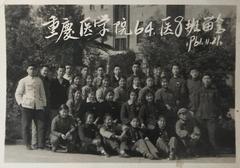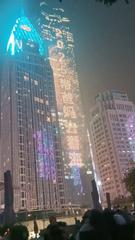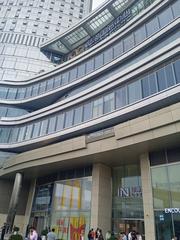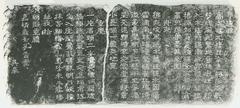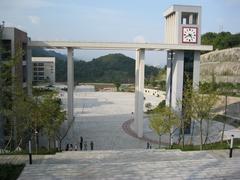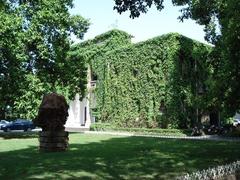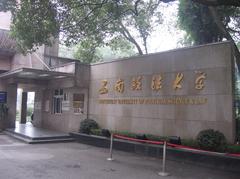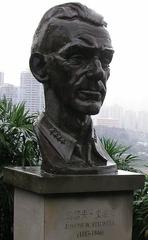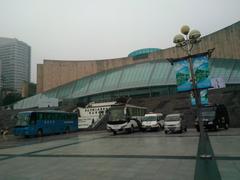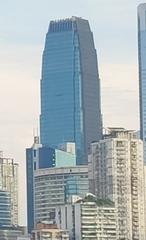Gongtan Ancient Town Visiting Hours, Tickets, and Comprehensive Travel Guide
Date: 15/06/2025
Introduction to Gongtan Ancient Town
Gongtan Ancient Town (龚滩古镇), located in Youyang Tujia and Miao Autonomous County near Chongqing, China, is renowned for its deep historical roots, ethnic diversity, and well-preserved Ming and Qing dynasty architecture. Overlooking the confluence of the Wujiang and Apeng Rivers, Gongtan has served as a vibrant port and trading hub for over 1,700 years. Today, it stands as a living museum where Tujia and Miao cultures flourish through festivals, crafts, and daily life, all set against a backdrop of dramatic natural beauty (official tourism site; Chongqing cultural portal).
This guide presents key information on Gongtan Ancient Town visiting hours, tickets, transportation, accessibility, architectural and natural highlights, cultural experiences, and practical travel tips—everything you need to plan a memorable visit to one of Chongqing’s most enchanting historical sites.
Quick Reference: Contents
- Introduction
- Visitor Information
- Visiting Hours
- Tickets and Admission
- Getting There
- Accessibility & Tours
- Photography Spots
- Special Events
- Historical & Cultural Background
- Town Origins & Development
- Economic & Strategic Role
- Architectural Features
- Ethnic Traditions
- Notable Historical Sites
- Preservation & Recognition
- Practical Travel Tips
- Frequently Asked Questions (FAQ)
- Nearby Attractions
- Conclusion & Call to Action
- Sources
Visitor Information
Visiting Hours
Gongtan Ancient Town is open daily from 8:00 AM to 6:00 PM. Some attractions within the town, such as temples and guildhalls, may have specific opening hours, so check in advance if you wish to visit these sites.
Tickets and Admission
- General Admission: Approximately 60 RMB per person.
- Discounts: Available for students, seniors, and children.
- Where to Buy: Tickets can be purchased online via official platforms or at the entrance.
- Free Areas: Walking the main streets is generally free; specific historical buildings may have nominal entry fees (chinatripedia.com; Trip.com).
Getting There
- By Bus: Direct buses from Chongqing to Youyang County, then local transport to Gongtan.
- By Car: About 4–5 hours from central Chongqing via the G65 Baotou–Maoming Expressway.
- By Train: High-speed rail to Pengshui Railway Station, then a short taxi ride.
- Guided Tours: Available through local agencies, often including transportation and historical context.
Accessibility & Guided Tours
Gongtan’s hilly terrain and stone-paved streets can be challenging for those with mobility issues, but some ramps and assistance are available. Local guides offer walking tours and boat excursions, providing in-depth insight into history, architecture, and ethnic culture. Booking guided tours in advance is recommended, especially during peak seasons.
Recommended Photography Spots
- Main Stone-Paved Street: Lined with stilted houses and ancient structures.
- Wujiang River Views: Especially at sunrise or sunset.
- Dragon-Shaped Bridge: Iconic and photogenic.
- Stilt Houses (Diaojiaolou): Best viewed from across the river.
- Night Views: Lantern-lit riverside and illuminated architecture.
Special Events
Key festivals include the Tujia Hand-Waving Dance, folk music performances, and cultural markets. Local holidays and festivals provide immersive opportunities to experience traditional rituals, music, and cuisine (Chongqing cultural portal).
Historical & Cultural Background
Town Origins & Development
Gongtan traces its origins to the Eastern Han Dynasty (25–220 CE). Its prosperity peaked during the Ming and Qing dynasties, when it became a major port for salt, tea, and agricultural goods. The unique riverside setting fostered commercial vibrancy and a diverse population (official tourism site).
Economic & Strategic Role
As a strategic trading hub, Gongtan attracted merchants, artisans, and ethnic groups from across southwestern China. The town’s historic wharf was central to the Wujiang River Basin’s economy (Chongqing cultural portal).
Architectural Features
- Stilted Houses (Diaojiaolou): Wooden homes perched on stone foundations along the river, emblematic of Tujia heritage.
- Stone-Paved Streets: The main street stretches for 2 kilometers, lined with more than 200 ancient courtyard houses and distinctive fireproof walls.
- Bridges: The Double Bridge (Qiao Chong Qiao) and others span the town’s streams, integrating function with beauty (meiyatravel.com; chongqingdeeptour.com).
- Guildhalls & Temples: Sites like the Xiqin Guild Hall and Chuan Master Temple reflect the town’s mercantile and spiritual heritage.
Ethnic Traditions
Gongtan has a vibrant mix of Tujia and Miao residents. Traditional crafts (weaving, embroidery, silver jewelry), music, and dance (notably the Hand-Waving Dance) are integral to the town’s cultural identity.
Notable Historical Sites
- Manwang Cave: Linked to ancient Ba culture.
- Suspended Tombs: Remnants of the Bo People.
- Iron Fortress Ruins: Traces of Song dynasty defenses.
- Cliff Inscriptions: Literary relics like “Great Wave Surging to the Bank.”
- Wujiang River Towpath: Historic river navigation route.
Preservation & Recognition
Due to dam construction, much of Gongtan was carefully relocated and restored, preserving its essential architecture and atmosphere. The town is recognized as a National AAAA Scenic Spot and a Chinese Historical and Cultural Town (official tourism site).
Practical Travel Tips
- Footwear: Wear comfortable, non-slip shoes to navigate uneven, sometimes slippery stone streets.
- Luggage: Avoid large suitcases due to narrow alleys and stairs.
- Photography: Early morning and late afternoon light are best.
- Cruises: Wujiang River sightseeing cruises (approx. 150 RMB) depart regularly from the riverside.
- Accommodation: Inns and guesthouses in traditional buildings offer atmospheric stays; book in advance.
- Dining: Sample local specialties such as river fish, mushroom dumplings, and Tujia hotpot (China Discovery).
- Payments: Cash is preferred; some shops accept WeChat Pay or Alipay.
- Language: Mandarin is standard; translation apps are helpful.
Frequently Asked Questions (FAQ)
Q: What are Gongtan Ancient Town’s visiting hours?
A: 8:00 AM–6:00 PM daily.
Q: How much is admission?
A: Standard ticket is about 60 RMB. Discounts available for eligible groups.
Q: How do I get there from Chongqing?
A: By car (4–5 hours), by bus to Youyang County, then local transport, or by train to Pengshui and taxi.
Q: Are guided tours available?
A: Yes, walking and boat tours can be booked via local agencies.
Q: Is the town accessible for wheelchair users?
A: Accessibility is limited; some ramps exist, but terrain is challenging.
Q: What is the best time to visit?
A: Spring (March–May) and autumn (September–November) for mild weather and festivals.
Q: Can I stay overnight?
A: Yes, several guesthouses and inns are available within the ancient town.
Nearby Attractions
Expand your trip with visits to:
- Taohuayuan Scenic Spot: Famous for natural beauty and peach blossoms.
- YangGong Stone Forest: Unique limestone formations.
- Tianmen Mountain National Forest Park: Hiking and panoramic views.
- Longtan Ancient Town and Hewan Mountain Village: Rich in culture and scenery (chinatripedia.com).
Conclusion & Call to Action
Gongtan Ancient Town is among the finest Chongqing historical sites, offering an immersive journey into China’s river culture, ethnic diversity, and imperial heritage. Whether you are a history enthusiast, photographer, or cultural explorer, Gongtan promises an unforgettable experience.
Plan your visit:
- Check official sites for the latest visiting hours and ticket updates.
- Download the Audiala app for exclusive guides, virtual tours, and live event updates.
- Follow us on social media for travel inspiration and practical tips.
Sources and Further Reading
- This is a sample text. (official tourism site)
- This is a sample text. (Chongqing cultural portal)
- This is a sample text. (Top China Travel)
- This is a sample text. (chinatripedia.com)
- This is a sample text. (Trip.com)
- This is a sample text. (meiyatravel.com)
- This is a sample text. (chongqingdeeptour.com)
- This is a sample text. (China Discovery)

